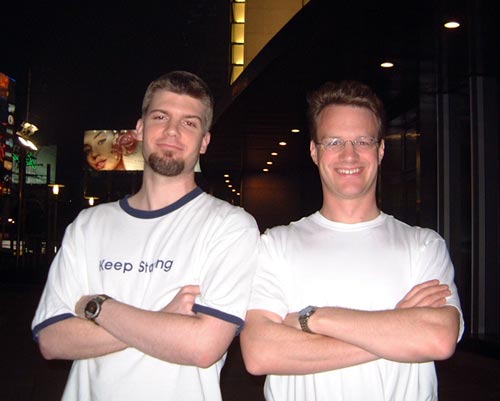Dashan Explains His Chinese Name
In my last article on How to Choose a Chinese Name: 4 Approaches, I used the example of Mark Rowswell, AKA 大山 (Dàshān). Mark and I have a history of correspondence, so I decided to get in touch by email and get his take. He provided quite a lot of background info (much more than I was expecting), so I thought it would be good to share.

The following is our exchange, starting with his reply.
Mark (大山) wrote:
许大山 [Xǔ Dàshān] was the character name, but I dropped the surname when I took 大山 [Dàshān] as a stage name and then eventually as my all-purpose Chinese name. At that point I completely stopped using the name I had been given in Chinese class at university.
I never use a surname with 大山, as I think of it like “Sting” or something. It’s a standalone name by itself. And I always spell it as one word in Pinyin, which should be the convention for given names. It’s not correct to write it as Da Shan, as some people insist, because “Da” is not the surname. I notice you did spell it as “Dashan” in the article (but you did get “Rowswell” wrong, ha ha). [Since fixed!]
For “official use” it’s actually kind of arbitrary. My legal name is only what appears on my birth certificate, passport, etc. and that’s only in English. The Chinese name has no legal standing. But of course various Chinese organizations sometimes insist on using a Chinese name for official purposes. In that case, sometimes they take 大山, other times they insist on using 马克·罗斯维尔 [Mǎkè Luósīwéi’ěr]. I don’t really care, it’s just paperwork, so I let them use whatever they want. I just think it’s arbitrary because neither name is actually a legally registered name, and how you transliterate into Chinese can be quite flexible. I mean, there is a standard, official translation for “Mark” as 马克 [Mǎkè], but what is the official translation of “Rowswell”? There is none, so you can only follow general guidelines to come up with something like 罗斯维尔 [Luósīwéi’ěr].
Nowadays, when people use something like 啊啊啊啊啊啊啊啊 [Ā’ā’ā’ā’ā’ā’ā’ā] as their name, even with breaking convention by not having a surname 大山 is pretty conservative in comparison, ha ha
I replied:
大山 like “Sting”… Ha ha, that’s kind of hilarious.
I’m a stickler for proper pinyin most of the time, but I’m surprised I got your English surname wrong. Sorry! It was a typo and has been fixed.
Anyway, I had no idea that “official Chinese names” were so arbitrary. But that’s true of so many things in China… It all comes down to how local officials interpret and carry out the directives from above.I’d like to run a correction/update on my blog. Would you mind if I quoted your reply in this email? Few westerners have as much China experience as you!
And Mark (大山) replied:
Yeah, I’m kinda dating myself with the old “Sting” reference, and of course Dashan was always way cooler than Sting, but it seemed to be the easiest example.
I’m OK if you want to quote this reply. It’s all pretty basic stuff. The main reason “Dashan” stuck as a stage name is that it’s super easy to remember, and it has the added joke factor of implying the slang phrase 侃大山 [kǎn dàshān], which was particularly popular in the ‘80s and ‘90s. I think a third angle is that it’s a typical peasant name, which is strange for a foreigner. Because the Chinese names we are given when we start studying Chinese are usually very proper and cultured, even kind of poetic, or else they are a strict transliteration, it just seems funny when a foreigner takes a simple peasant name. That was part of the joke of the original skit, and the main reason the name stuck. I grew to like it because it’s down-to-earth and people find it relatable, so it matches the public image I was trying to portray.
Mark touches on a quite a few of the issues I brought up on my original post on Chinese names, so I figured this could serve as an interesting case study of sorts.

I have a Chinese driver’s license. When I was getting it, they didn’t want to enter my English name, so they entered my Chinese name, which is essentially one I picked out of a hat. This now “official document” has been used to get me into a local hotel, when a passport was “discouraged.” I don’t think it’s good for much else though, except for traffic tickets.
Chinese Malaysians faced similar issues; the British (colonial) authorities insisted on alphabetic spelling of Chinese names, and this has resulted in often inconsistent naming conventions. For example, my grandfather’s family name is spelt Chung, but my father’s is spelt Choong.
It would be good to see Dashan as a guest on the podcast. He’s like the yard stick with which all westerners Chinese speaking abilities are measured against. He also seems pretty down to earth.
My Chinese name was given to me by my students in Shanghai during the 1990s when China was just beginning its reforms under Deng Xiaoping and Zhu Rongji. It’s Pei Zhi Chao which means the idealist, superman or the ambitious one. I do have high ideals as a historic Christ-follower, but I’m somewhat ambitious, but not ruthless and one who “climbs the ladder” and steps on people to achieve my ambitions. My Chinese nickname is Chao ren (Superman). When I introduce myself in my first class, I show a ppt and tell them my nickname is….then I take off my shirt to reveal a Superman T-shirt underneath. They go wild.
Ha ha… that’s great! Names definitely have a certain power, right??
I actually know a Chinese woman with two boys who go by the (nick)names of 超人 (Superman) and 浩克 (Hulk).